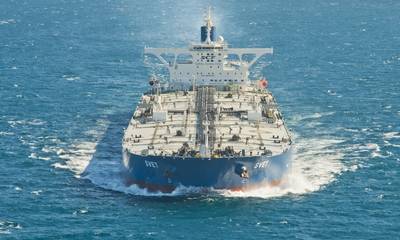Russia plans to sell part of state shipping firm Sovcomflot next month, hoping to draw in a wide range of small-stake investors rather than a strategic buyer who could threaten Moscow's control of the group, banking and industry sources say.
The current era of low tanker market prices is far from the ideal time for Sovcomflot to raise revenue with a share offer, as freight rates were at their highs in 2015. Sovcomflot operates the world's second largest fleet of oil tankers.
But the tangled history of Russian privatisations has often been driven as much by political and personal factors as commercial ones.
Sovcomflot is led by Sergei Frank, once transport minister under President Vladimir Putin, whose privatisation programme is an effort to replenish state coffers hit by the oil price collapse and Western sanctions over Moscow's actions in Ukraine.
The firm has long-term contracts with major energy producers, making it one of the jewels in the programme.
Analysts say the deal could be especially favourable for investors, because low oil prices are likely to push down the current price of shares, with the prospect of big returns later.
A banking source close to the deal, and a government source, said that the latest plan calls for a wide range of investors, with no strategic or anchor investors involved.
"A strategic investor will ask for the right to be involved in the management, one day or another. This is not what Sovcomflot needs," a government source said.
The banking source said that the plan is to attract as wide number of investors as possible, including foreigners. Both declined to identify any potential bidders.
People familiar with the sale said there were plans for an initial public offering in Moscow in June.
In emailed comments to Reuters, Sovcomflot declined to comment on the details, saying that it was for the shareholder, the Russian state, to decide.
The Economy Ministry, which is overseeing the privatisation, said in emailed comments: "There is a high interest seen from both Russian and foreign institutional investors."
Timing
Russia is selling 25 percent of Sovcomflot, and hopes to earn as much as 30 billion roubles ($533 million) from the sale, according to the finance ministry.
The firm ships oil from remote locations not connected to the Russian pipeline system. These include some of Russia's biggest fields, such as Gazprom Neft's Prirazlomnaya platform in the Pechora Sea, or the ExxonMobil-led Sakhalin-1 project.
Sovcomflot also has the contract to ship liquefied gas from Russia's newest liquefied natural gas plant, Yamal LNG.
"When you have 30-, 25-, 20-year-long contracts, it is an easy-to-sell story, especially via IPO," the government source said.
First mooted in 2009, the launch of the privatisation has been repeatedly stalled. The initial plan was to list Sovcomflot in New York and Moscow, but the U.S. listing was dropped because of sanctions, another banker said.
Sovcomflot itself is not subject to sanctions but "there is an understanding it is better to do the deal here," the banker said.
The state budget is set to retain 75 percent of the funds raised and the rest should go to the company to finance its further development, two government sources said.
One of the government sources and two banking sources close to the process said the aim was to close the sale by the end of June.
Sberbank CIB and VTB Capital, investment banking units of Russia's two biggest and state-controlled banks, are arranging the deal.
Three shipping analysts said Moscow would get a better price if it put off the sale for another year or two, when they see rates for crude transport recovering after more than halving since 2015.
"The best time to sell the Sovcomflot stake was 2015 and the Russian government has already missed it," said Nikesh Shukla, lead tanker shipping analyst at Drewry Financial Research Services.
But Russia's government, with a budget deficit projected at 3.2 percent of GDP for 2017, needs the revenue. Estimates of what could be raised by privatisations this year vary widely, running as high as 200 billion roubles.
The state has said it aims to sell off or reduce its holdings in almost 2,000 companies in 2017-2019.
The privatisations of old Soviet industries in the 1990s brought accusations that state assets had been transferred at bargain prices to "oligarchs" in exchange for political favours.
(By Gleb Stolyarov and Jack Stubbs; Additional reporting by Olga Popova, Kira Zavyalova, Polina Nikolskaya, Darya Korsunskaya and Andrey Ostroukh; Editing by Katya Golubkova)













